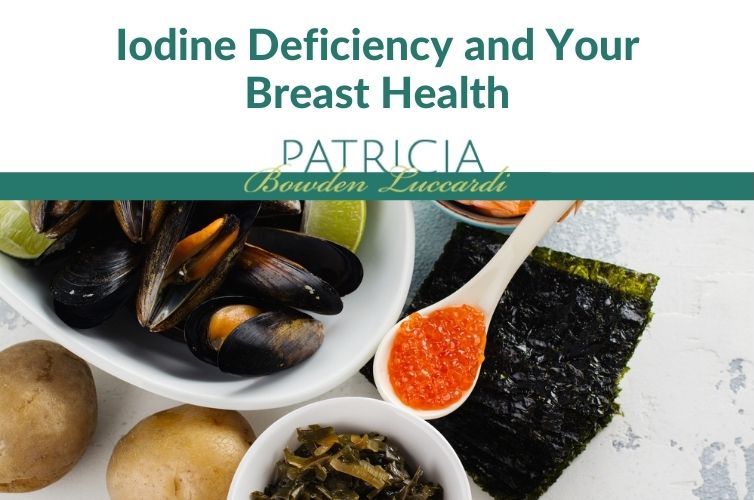Is Iodine Deficiency Putting Your Breast Health at Risk?
Leave a CommentThe number of women diagnosed with breast cancer has been increasing dramatically in recent years.
As a thermographer I can attest to this as I have personally seen an increase in women with fibrocystic breast, suspicious thermographic findings and breast cancer over the past 2 years.
Aren’t we getting tired of these statics?
One out of eight women is diagnosed with the disease with a staggering 4,000 new cases diagnosed weekly.
Every year in the United States, more than 186,000 women are diagnosed with breast cancer and more than 41,000 die because of the disease. With the billions dedicated to cancer research only 1-3% spent in research goes to prevention.
Breast cancer is an industry that focuses on treatment, not prevention.
The rhetoric of the war on breast cancer is just that…rhetoric, women want answers to prevent, treat and gain remission from the grip of breast cancer.
Informed women are aware of the actions they can take to minimize their risk of developing breast cancer like reducing exposure to environmental estrogens and other toxins in their body, including:
- eating healthy organic produce,
- consuming hormone -free animal products,
- using natural skin care products,
- maintaining optimal levels of vitamin D,
- exercising on a regular basis,
- maintaining a healthy weight,
- ditching their under-wire bras,
- healing sexual trauma and
- getting a yearly thermogram to monitor the health of their breasts.
However, there is one secret weapon many women are not aware of: the essential mineral known as iodine.
Iodine helps your hormone receptors function properly, giving your hormones the ability to communicate with ease and allowing your moods to be regulated. The breast tissue also requires iodine to remain healthy.
There is growing evidence linking iodine deficiency and:
- breast cancer,
- fibrocystic breast,
- uterine fibroids,
- thyroid nodules,
- breast cysts,
- pancreatic cancer,
- prostate cancer,
- thyroid cancer and
- lower IQ.
Estrogen production becomes unbalanced and dysfunctional, and breast tissue becomes more sensitive to estrogen. Cystic changes occur, increasing the risk of breast cancer. Iodine turns on cancer cell death, apoptosis.
Dr. Dave Derry, breast health specialist, states “iodine enables the excess cells [in the breasts] to be cleared out, and the breast can return to its natural state as the fibrocystic disease slowly disappears from the breast. A lack of iodine in the body can lead to the development of fibrocystic breasts.” You can read more at www.theiodineproject.webs.com
Results obtained in studies of breast health noted that all forms tested: molecular iodine, sodium iodide and potassium iodide produced beneficial results; the best results were achieved with molecular iodine. Molecular iodine comes from sea vegetables.
Without the proper amount of iodine, breast tissue can become fibrocystic or develop precancerous and cancerous lesions.
Recent research shows prolonged deficiencies of iodine can exacerbate or be a contributing factor in the development of breast cancer. Animal studies conducted over 40 years ago showed breast tissue of animals with iodine deficiency developed cancer when the deficiency was not corrected.
The same study showed the risk of breast cancer was directly related to the length of time the iodine deficiency was present. Iodine deficiency is also known to cause fibrocystic breast disease.
It is a pre-cancerous condition of the breast tissue, which makes your breast very painful and fibrous.
Due to the fibrous and dense nature of breast tissue in a fibrocystic state, it is very difficult for doctors to detect the presence of breast cancer.
Iodine supplementation has been shown to significantly decrease breast pain, tenderness, and nodules of women with fibrocystic breast disease.
Iodine can also decrease uterine fibroids.
Japanese women consume a diet high in iodine-rich seaweed, which provides them with an iodine intake twenty-five times higher than the average American woman.
Japanese women also have breast cancer rates roughly one-third of those found in American women, and that disappears in Japanese women who immigrate to the US, where they consume considerably less seaweed.
If you have Graves Disease, or Hashimotos, please consult your physician before supplementing with iodine.
There are three beneficial forms of iodine to nourish multiple body systems. Three forms are optimal because different tissues in the body prefer different forms.
For example, your thyroid tissue absorbs iodine best as potassium iodide, while breast tissue takes up iodine in the form of molecular iodine. Additionally, there is evidence using sodium iodide enhances absorption of the other forms. Iodine supplementation is not just for preventing goiter.
Actually, only a small amount of iodine is really necessary for preventing goiter. But today, doctors have found that all tissues of the body require iodine.
The breasts, ovaries, uterus, thyroid, brain and prostate tissue require iodine.
This is far from a definitive guide to iodine as there is so much information and science out there on the subject. We need to know of its importance in breast health as well as in all endocrine health. Look for the continuation of iodine in the next blog or grab a copy of by book: Thermography and the Fibrocystic and Dense Breast that provides further information.
When we are educated about our breast health, it is empowering. No one loves her breasts as much as you do, and you want to keep them for the rest of your life!
Here’s to your health, happy breasts!

